AMD Radeon HD 7970 GHz Edition Review: Battling For The Performance Crown
by Ryan Smith on June 22, 2012 12:01 AM EST- Posted in
- GPUs
- AMD
- GCN
- Radeon HD 7000
OC: Power, Temperature, & Noise
Our final task is our look at the 7970GE’s overclocking capabilities. As the 7970GE is based on the existing 7970 we aren’t expecting any significant changes, however it’s reasonable to expect that general manufacturing process improvements over the last 6 months will have pushed yields and tolerances a little higher, giving us just a bit more headroom.
At the same time the presence of the boost clock and its associated voltage is going to change overclocking as well. The higher voltage should lend itself to higher overclocks, meanwhile validating overclocks is also going to be a bit harder as now we need to make sure neither the overclocked base clock/voltage combination or the overclocked boost clock/voltage combination is unstable, similar to the extra effort needed to overclock the GTX 680 series.
| Radeon HD 7970 Series Overclocking | |||||
| Ref 7970GE | Ref 7970 | XFX 7970 BEDD | |||
| Shipping Core Clock | 1000MHz | 925MHz | 1000MHz | ||
| Shipping Max Boost Clock | 1050MHz | N/A | N/A | ||
| Shipping Memory Clock | 6GHz | 5.5GHz | 5.7GHz | ||
| Shipping Max Voltage | 1.218v | 1.175v | 1.175v | ||
| Overclock Core Clock | 1150MHz | 1100MHz | 1125MHz | ||
| Overclock Max Boost Clock | 1200MHz | N/A | N/A | ||
| Overclock Memory Clock | 6.4GHz | 6.3GHz | 6.3GHz | ||
| Overclock Max Boost Voltage | 1.218v | 1.175v | 1.175v | ||
After going through the full validation process we were able to hit an overclock of +150MHz, which pushed our base clock from 1000MHz to 1150MHz, and our boost clock from 1050MHz to 1200MHz. Depending on how you want to count this overclock amidst the presence of the boost clock this is either 25MHz better than our best 7970 card, or 75MHz better. In either case our 7970GE definitely overclocks better than our earlier 7970 cards but not significantly so, which is in-line with our expectations.
As with any overclocking effort based on a single sample our overclocking results are not going to be representative of what every card can do, but they are reasonable. With AMD now binning chips for the 7970GE we’d expect to see some stratification among the 7970 family such that high overclocking chips that would previously show up in 7970 cards will now show up in 7970GE cards instead. For penny-pinching overclockers this is not good news, but for more hardcore overclockers this is nothing new as AMD’s partners have been doing something similar with their factory overclocked cards for some time now.
Meanwhile our memory overclock isn’t significantly different from what we could pull off with the reference 7970. The limitation is the memory bus or Tahiti’s memory controller, neither of which has changed. After around 6.4GHz errors start catching up and performance gains become performance losses.
Moving on to our performance charts, we’re going to once again start with power, temperature, and noise, before moving on to gaming performance. We’ll be testing our 7970 cards with the PowerTune limit set to +20% in order to avoid any real possibility of being performance limited by PowerTune.
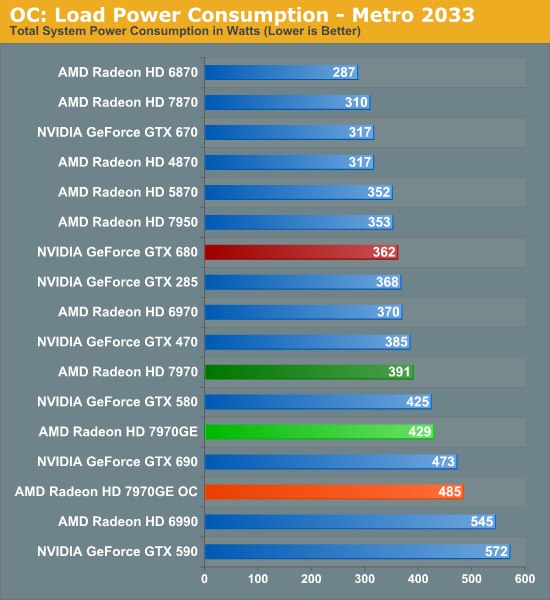
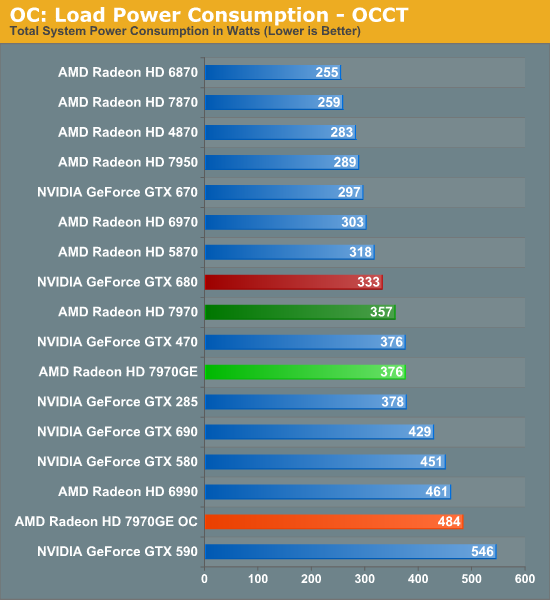
With the 7970GE’s already high load power, overclocking and raising the PowerTune limits isn’t doing it any favors when it comes to overclocking. On the contrary to being a free overclock power consumption now exceeds even the GTX 690 in all situations and power consumption is almost certainly in excess of 300W at the card level. As we’ll see in our gaming performance section we’re definitely getting more performance out of the 7970GE, but we’re paying for it with power.
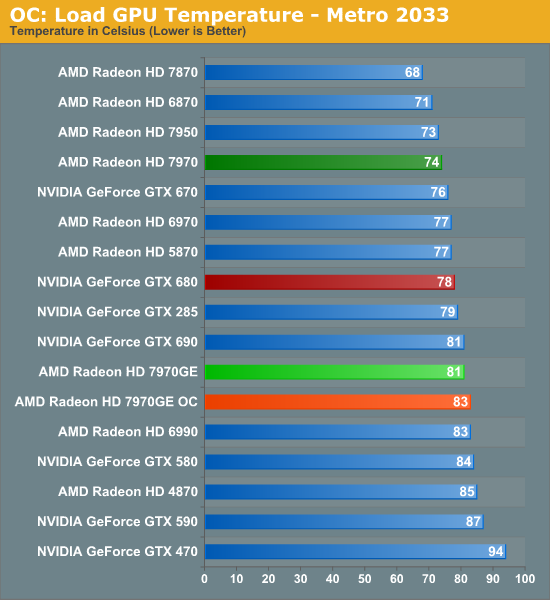
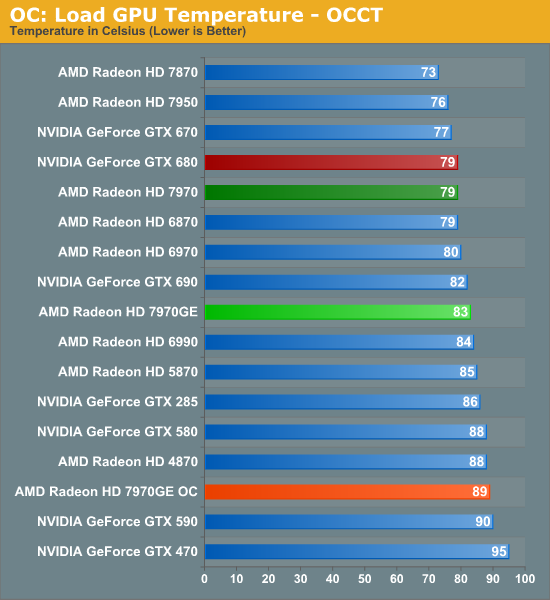
With a rise in power consumption comes a rise in temperatures to a varying degree. At 83C under Metro the 7970GE has gotten warmer, but not significantly so. The same cannot be said for OCCT. At 89C we’re approaching the reasonable limits for this card and cooler.
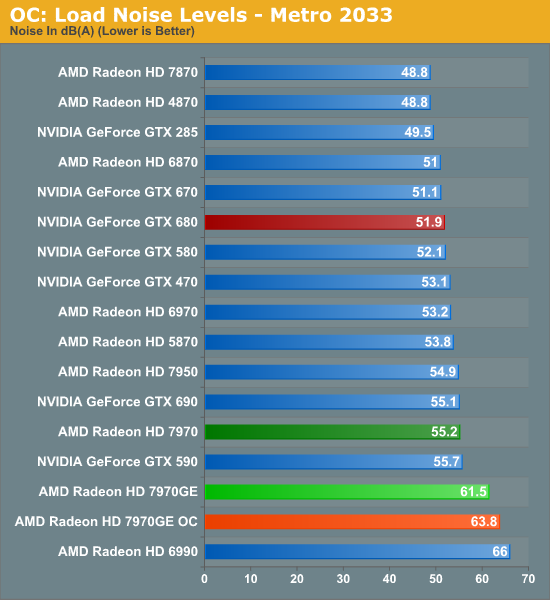
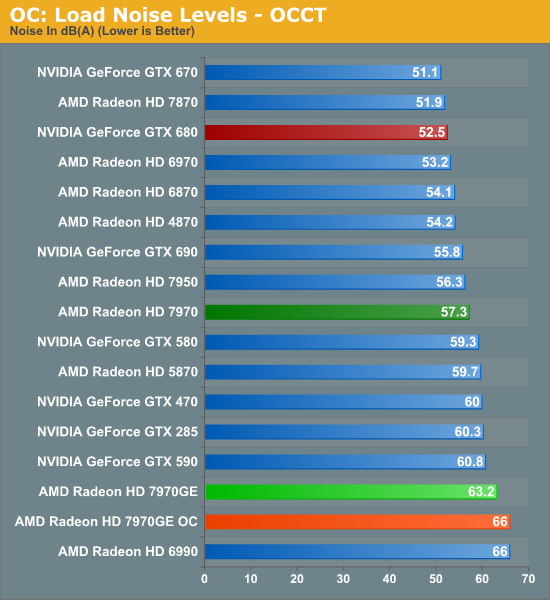
The 7970GE was already loud at stock and overclocking it doesn’t help. Under Metro noise is now at 63.8dBA, and under OCCT it’s tied with the 6990 for noise at 66dBA. Even if you’re forgiving of noise, this is reaching the point where it’s going to be difficult to ignore. Serious 7970GE overclockers will want to seek other cards and/or aftermarket coolers.










110 Comments
View All Comments
Belard - Friday, June 22, 2012 - link
Agreed.Articuno - Friday, June 22, 2012 - link
A whole new card launch and yet another pair of similarly named but differently performing products because they changed a few numbers that anyone can in several free, easily available programs.I suppose they can do this because you can actually buy their products though, unlike the 6XX series.
ExarKun333 - Friday, June 22, 2012 - link
Yeah, tough to find 6xx products indeed. There is something called the 'internet' you could check out. Your buddy who posted for you might be able to help you out. ;)Pantsu - Friday, June 22, 2012 - link
I doubt any AIB will actually release GE cards with reference cooling. Most likely they will be custom cooled, so the loudness of the reference card is a bit of a moot point.It's good to see some decent driver improvements from AMD. I'm still quite happy about 7970 performance at 5760x1080, and it's enough for most games when OC'd. It would be interesting to see though, whether the GE has improved the max OC. Most likely it's no better though, and you'll be better off buying an old custom 7970 for a good price and OC'ing it to the same levels as the GE.
dagamer34 - Friday, June 22, 2012 - link
The GE chips are better binned parts, one would assume that they have a bit more room for higher clocks than the normal 7970 parts. Certainly the average overclock will be higher.CeriseCogburn - Saturday, June 23, 2012 - link
So we can deduce that the prior 7970 overclocks were sucking down an even larger amount of enormous electrical power as those chips are of lower bin.I guess we need an overclocked power suction chart with an extended table for the amd housefire 7970.
Any savings on card price or a few frames at a resolution near no one owns will be gobbled up by your electric bill every month for years - save 1 watt or 9 watts at extended idle, but when you game it's 100+ watts and beyond with the overclocked 7970 - maybe they should be $300 with 3 games.
silverblue - Monday, June 25, 2012 - link
Well, it works both ways. You won't always be gaming, in addition there's all that compute hardware that, if properly harnessed, would save you money over competing solutions because you'd get the job done quicker. It used to be pointless to consider using anything for compute that wasn't a Quadro, Tesla or even FirePro, however those days are coming to an end.Having a 7970 will make sense for compute if that's your bag (there's a reason for the die size plus the extra memory and bus width), but this time, NVIDIA enjoys a performance/watt advantage which might go unchallenged for a while. Unless, of course, that extra hardware on the 7970 is properly leveraged; future games, perhaps?
ltcommanderdata - Friday, June 22, 2012 - link
So do we think this will encourage nVidia to release a GeForce GK110 based product in the next few months rather than restrict it to Tesla?PsiAmp - Friday, June 22, 2012 - link
Nvidia isn't holding GK110 in its sleeve waiting for something. It is unfinished in the first place and there's no manufacturing capacity to produce such a large chip. Nvidia still struggles to fix GK104 design to have good yields. GK110 would be impossible to produce in since it is twice bigger and such will have at least 4 times less yield.Server market is not only much more profitable, it is operating on a contract basis. Nvidia will start to produce Tesla K20 in Q4 2012.
IF(?) desktop card based on GK110 will hit the market it won't be sooner than Q1 2013. And it is not something that you can change really.
silverblue - Friday, June 22, 2012 - link
"Of course this isn’t the first time we’ve had a hot & loud card on our hands – historically it happens to NVIDIA a lot – but when NVIDIA gets hot & loud they bring the performance necessary to match it. Such was the case with the GTX 480, a notably loud card that also had a 15% performance advantage on AMD’s flagship. AMD has no such performance advantage here, and that makes the 7970GE’s power consumption and noise much harder to justify even with a “performance at any cost” philosophy."Very true, however the power consumption and heat difference between the 5870 and the 480 was definitely more pronounced.
The 680 is an incredible card, no doubt about it. It may not win in some titles, but it's hardly anywhere near unplayable either. AMD being right there at the very high end is fantastic but unless titles truly make use of GCN's compute ability, the extra power and noise are going to be hard to swallow. Still, I'd own either. :P